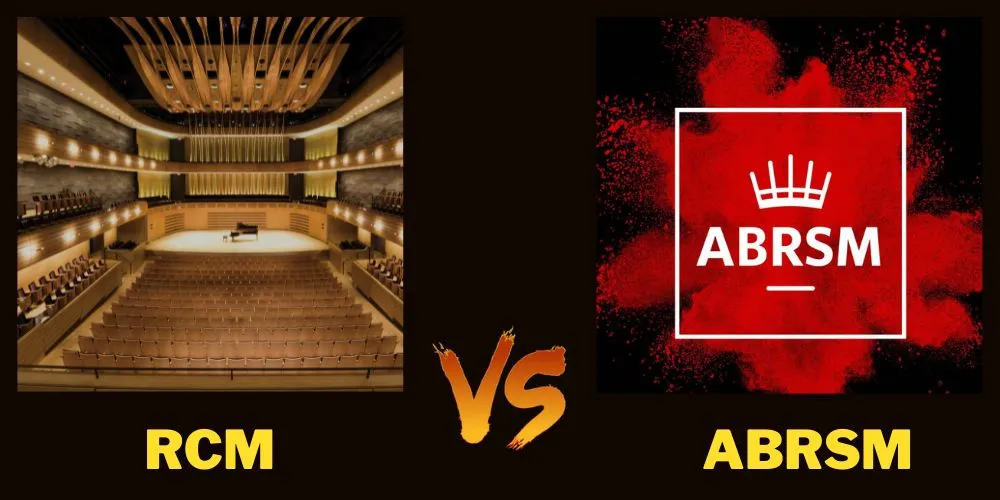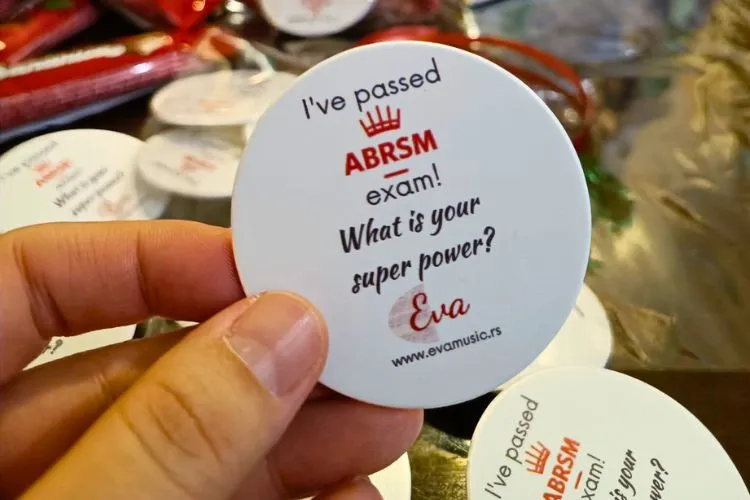Choosing the right syllabus for music education and examination is pivotal for aspiring musicians.
It lays the foundation for their musical journey, influencing not only their technical and theoretical knowledge but also their opportunities for future growth.
Among the myriad of options available, the Royal Conservatory of Music (RCM) and the Associated Board of the Royal Schools of Music (ABRSM) stand out as leading institutions.
This RCM Vs ABRSM article aims to provide a detailed comparison between the two, helping you make an informed decision that aligns with your musical aspirations.

Contents
🎶Understanding the RCM
The RCM, founded in 1886, is revered for its comprehensive curriculum and dedication to promoting musical excellence. Predominantly influential in North America, it has cultivated a legacy of fostering musical talent and appreciation.
The curriculum of the RCM is meticulously structured, comprising various levels and a grading system that evaluates a student’s technical skills, musicality, and theoretical knowledge.
The examination components are divided into practical and theoretical sections, each designed to challenge and refine different facets of a musician’s prowess.

One of the standout features of the RCM is its diverse repertoire, with an emphasis on classical music. However, it does not overlook other genres, allowing students to explore a broad spectrum of musical styles. This diversity is crucial in developing well-rounded musicians.
Advantages of studying under the RCM framework include receiving detailed feedback from exams, which is invaluable for students’ growth. Additionally, there’s a strong focus on comprehensive musicianship, equipping students with a deep understanding of music beyond performance skills.
However, potential limitations exist, such as geographic restrictions and the availability of examination centers, which might pose challenges for some students. Moreover, those with a keen interest in non-classical genres might find the repertoire slightly limiting.
🎶Understanding the ABRSM
In contrast, the ABRSM, established in 1889, has a global presence, setting the standard for musical assessment. It plays a pivotal role not just in the UK, but in over 90 countries, bringing music education to a worldwide audience.
The ABRSM’s exam structure spans Grades 1-8 and includes Diplomas for advanced students. The assessment areas are comprehensive, covering practical performance, theory, and aural tests, ensuring a holistic evaluation of a student’s abilities.

A distinguishing feature of the ABRSM is its inclusive approach to genres. The examination pieces cater to a wide range of musical tastes, reflecting the board’s commitment to fostering a diverse musical education.
The international recognition of the ABRSM is among its significant advantages, opening doors for students globally. Moreover, the wealth of resources and support available to both teachers and learners is unparalleled, enhancing the educational experience.
However, the pressure associated with graded exams and the potential limitations for specific instrumentalists are considerations that prospective students should take into account.
🎶RCM Vs ABRSM: A Comparative Analysis
When it comes to curriculum and examination structure, both RCM and ABRSM offer rigorous assessments designed to elevate students’ musical capabilities. The main differences lie in their theoretical components and the emphasis placed on various genres.
Flexibility and accessibility are crucial factors for many students. Here, both boards have adapted to modern needs, offering online testing options and striving to expand their geographic availability. Choosing between the two may come down to personal convenience and location.
Recognition and opportunities that arise from certifications of both boards are significant. While RCM is highly revered in North America, ABRSM’s global recognition provides an edge for students looking to pursue opportunities internationally.
In terms of resources and support, both boards excel in providing supplementary materials and community engagement, albeit with some differences in focus and availability.
🎶Making the Right Choice
Deciding between RCM and ABRSM should be based on several personal factors. Consider your musical goals and aspirations: Are you aiming for a career in classical performance or looking to explore a variety of genres?
Your geographic location and the accessibility of examination centers also play a vital role. Lastly, your preference for musical genres and repertoire should guide your choice, ensuring your education aligns with your tastes and ambitions.
Some pro tips for making an informed decision include consulting with music educators and professionals who can offer insights based on your unique circumstances.
Reviewing examination syllabi and sample materials available on the RCM and ABRSM websites can also give you a clearer picture of what to expect.
Finally, consider your long-term career and academic goals, and how each board’s certifications might support these aspirations.
🎶Financial Considerations
Royal Schools of Music (ABRSM) based in the United Kingdom. Both organizations offer structured programs for musical learning and assessment.
The choice between RCM and ABRSM might be influenced by various factors including location, musical repertoire, and pedagogical approach, but financial considerations are paramount for many students and their families.
Below is a detailed comparison of the costs associated with each syllabus, covering exam fees, materials, and tuition where applicable.
Exam Fees
RCM
- Preparatory Levels and Level 1-10: Fees range from CAD$110 for the initial levels to CAD$215 for the advanced levels.
- ARCT (Associate of the Royal Conservatory): Performance exam fees are about CAD$500, and theory exam fees are around CAD$150.
ABRSM
- Grades 1-8: Fees start at approximately GBP£40 for Grade 1 practical exams to around GBP£95 for Grade 8.
- Diplomas: Fees for diplomas start at approximately GBP£190 and can go up to GBP£315, depending on the level of the diploma.
Materials
RCM
Books and Materials: For each level, students need to purchase specific books covering repertoire, studies, and theory. The cost usually ranges from CAD$20 to CAD$50 for each book. A full set of books for a single level could range between CAD$60 to CAD$150.
ABRSM
Books and Materials: Similar to RCM, students are required to purchase books for practical exams, theory, and sight-reading. Costs can range from GBP£5 to GBP£25 per book. A full set of materials per grade could vary between GBP£15 and GBP£75.
Tuition
Tuition fees vary significantly based on several factors like the teacher’s experience, location, and lesson length. On average:
RCM
Private Lessons: On average, CAD$30 – CAD$60 per half-hour lesson. A year of weekly lessons can cost between CAD$1,560 and CAD$3,120.
ABRSM
Private Lessons: In the UK, lesson costs are similar, roughly GBP£15 – GBP£35 per half hour. For a year of weekly lessons, the cost ranges from GBP£780 to GBP£1,820.
Other Costs
- Accompanists: Students of both RCM and ABRSM often require an accompanist for exams, which can cost between CAD$50-150/GBP£30-100 per exam, including a rehearsal.
- Travel: Depending on your location, there might be travel costs to consider for attending exams or purchasing materials.
Keep in mind that costs can fluctuate based on the specific path within each program, such as focusing on performance vs. theory, as well as local variations in pricing. Additionally, other expenses might include instrument purchase and maintenance, digital apps for learning, and more.
When choosing between RCM and ABRSM, it is important to consider both the financial investment required and the specific educational outcomes you or your family are seeking.
Both programs have their unique strengths and might cater differently to individual learning styles, objectives, and financial situations. It’s also recommended to check the most current fees on their official websites or by contacting local representatives, as fees and requirements can change.
🎶Frequently Asked Questions (FAQs)
Yes, switching is possible, but it’s crucial to evaluate how the syllabi and examination requirements align to ensure a smooth transition.
Both boards are highly regarded, with many institutions accepting their qualifications for credit or admission into music programs.
Both RCM and ABRSM offer programs tailored for beginners. The choice depends on your stylistic preferences and long-term goals.
While both cover fundamental theoretical knowledge, subtle differences in approach and emphasis may influence your choice.
Yes, both boards have adapted to offer online examination options, particularly for theoretical components.
Conclusion
Both the RCM and ABRSM have their unique strengths and limitations, catering to different student needs and preferences. By reflecting on your musical journey and considering the points discussed, you can choose the examination board that best aligns with your personal and professional goals.
Remember, the right choice is the one that supports your growth as a musician and opens up the paths you wish to explore in your musical career.
Choosing between RCM and ABRSM is a significant decision in any musician’s education. By thoroughly researching and considering each board’s offerings, you can embark on a musical journey that not only enhances your skills but also fulfills your artistic aspirations.
